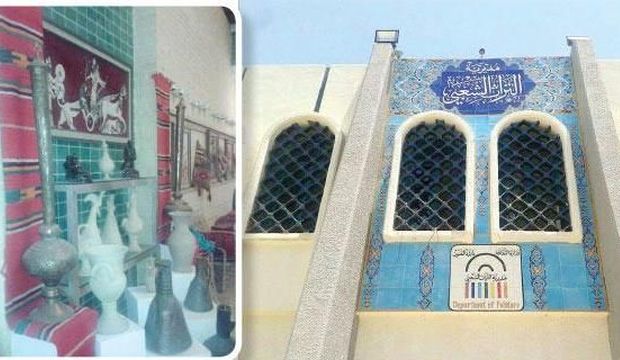
The National Heritage Museum in Baghdad, Iraq. Inset left, some of the objects on display at the museum. (Asharq Al-Awsat)
Baghdad, Asharq Al-Awsat—The National Heritage Museum in the Iraqi capital Baghdad is reopening after having been closed for 10 years following its being looted during the US-led invasion and fall of former dictator Saddam Hussein in 2003.
Speaking to Asharq Al-Awsat, Mohannad Al-Shawi, director of the National Heritage Department at the Ministry of Culture, which is overseeing the reopening, said the museum, located in the Al-Eskan district in western Baghdad, had “undergone extensive renovations including the addition of new Baghdad shanasheel [oriental windows], known for their colorful engravings.”
He added: “The museum was designed in the old, traditional Baghdad architectural style, which makes use of traditional domestic building materials.”
The team at the museum—in coordination with the Ministry of Culture’s Fine Arts Department—has, since its ransacking in 2003, been leading a campaign to acquire rare antiquities for display in the museum’s newly restored Dome Hall. The museum’s new collection highlights the most common trade professions, popular coffeehouses, games, and traditions in the region dating back 200 years.
Shawi said visitors to the museum would now be able to enjoy viewing many of the new items on display, including several handmade carpets, handmade silver objects, traditional clothes for children and adults, and house-wares used by Iraqi families in the early 20th century.
He said the new collection also included traditional guestrooms, “complete with appliances manufactured by craftsmen well-versed in traditional Iraqi artisanship,” giving a full picture of everyday life in Iraq and the region during the last two centuries.
Dr. Shafiq Al-Mahdi, the director of the Fine Arts Department at the Ministry of Culture, said the museum was considered “an important symbol of the country” and would now act as “a hub for visitors and tourists from across the world eager to learn about Mesopotamian civilization.”

Trackbacks/Pingbacks